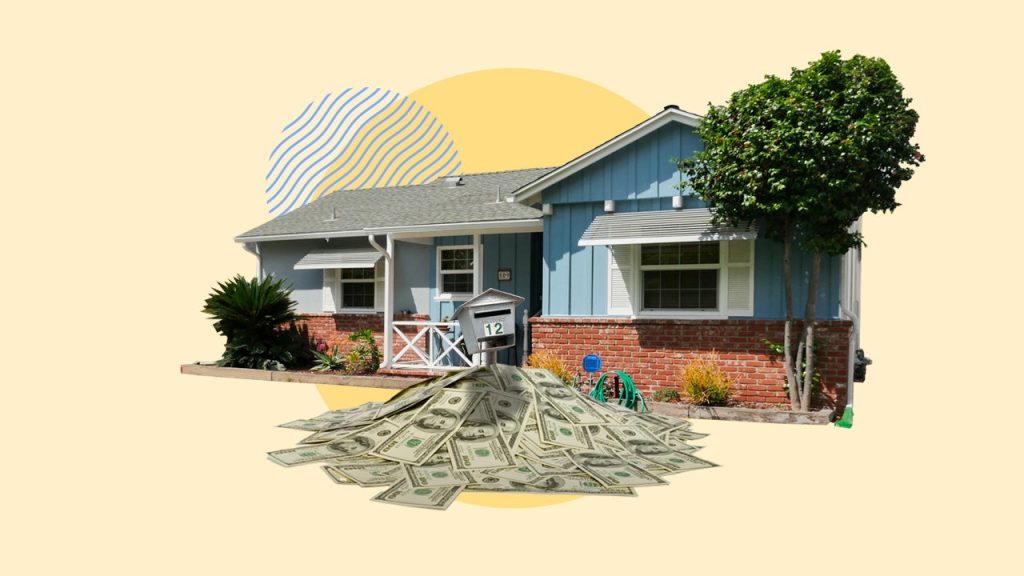Key takeaways
- Tapping into home equity carries several risks, including putting the property at risk, the potential to fall into significant debt, and the dilution of a valuable asset.
- The unpredictable nature of the housing market and high interest rates are also reasons not to borrow against a home’s worth.
- Financial experts advise homeowners to consider how they’ll use their home equity, prioritize emergency savings and debt repayment, and shop around for rates.
You’re feeling the need for some extra cash — with inflation and the high cost of living, who isn’t these days? — and it occurs to you that a worthy source of funds could be within your own house. Not underneath the floorboards (unless you’ve been stashing cash away for the end of the world), but via a home equity lending product, like a home equity loan (HELoan), home equity line of credit (HELOC), or cash-out refinance.
It’s certainly tempting: As residential real estate prices have soared, so has homeowners’ equity, and homesteads now contain a near-record amount of tappable cash. Despite the headlines, though, it may not be a good idea to borrow against your home equity, even if you have sound uses for the funds. The reasons range from the timely (the relatively high interest rate environment) to the eternal (the risks of hocking your house for cash); from current economic forces (the rising odds of a recession) to individual finances (the dangers of a debt overload). (We won’t even get started on the questionable uses, like buying a new car or booking a two-week cruise.)
Here’s what to consider when deciding whether to borrow against the value of your house — and why you may or may not want to.
What is home equity?
Home equity is simply the portion of your property you’ve paid off — the amount or percentage you own outright. It’s the difference between your home’s appraised/current market value and your outstanding mortgage loan balance. Put another way, it’s the sum you would pocket in a home sale after paying off what you owe to your lender (not counting closing costs). However, this equity is technically only a “paper” gain until you either sell or borrow against it.
According to the Federal Reserve, American homeowners collectively possess nearly $35 trillion in home equity as of Q4 2024. Individually, the average mortgage-holding homeowner has an equity stake worth around $303,000, according to property-data analyst Cotality.
How do you tap into home equity?
Before we delve into the pros and cons, a quick refresher on the basics. There are three primary ways to tap the equity stake you’ve accrued: a cash-out refinance of your mortgage, a home equity line of credit (HELOC) or a home equity loan.
Cash-out refinance
With a cash-out refinance (refi for short), you take out a new and bigger mortgage to replace your existing one. The difference between the two loan amounts is the cash you’ll pocket at closing, which equates to some of the equity you’ve accrued in your property (your lender may require you to keep at least 20 percent equity in your home). Your new loan’s outstanding principal will be higher than that of the loan it is replacing, but you can opt for a shorter or longer term.
“For example, if you owe $100,000 on a home that’s worth $200,000, you can take out a new mortgage for $150,000 and take the remaining $50,000 of equity as cash,” says Rick Sharga, president/CEO of CJ Patrick Company, an Orange, Calif.-based market intelligence firm. “But it’s important to realize that this will increase your debt, from $100,000 to $150,000 in this example, and will generally result in you paying more interest over time.”
You’ll also have to pay closing costs, as you would with most refinances.
HELOC (home equity line of credit)
A HELOC works as an adjustable-rate revolving line of credit. It’s somewhat like using a credit card — only, instead of your debt being unsecured (as it is with plastic), you’ll be required to put your home up as collateral. As with a credit card, you borrow what you need whenever you like (within a finite draw period), repay what you owe, and borrow again if you choose.
With a HELOC, your credit limit will be based on your available home equity; you can typically borrow up to 80 or 85 percent of the value of your home (not counting your unpaid mortgage balance). During the draw period — often the first 10 years — you’ll be required to pay monthly interest on any amount you borrow, but your funds will be replenished as you repay the principal. During the repayment period, funds are no longer accessible and you’ll be obligated to repay the principal and interest over 10 to 20 years, on average.
A HELOC has a variable interest rate that changes as the prime rate shifts — often, from month to month — so your overall balance and monthly payments will fluctuate too.
Home equity loan
A type of second mortgage, a home equity loan is taken out against the equity in your home. As with the HELOC, your home becomes collateral for the debt (meaning you could lose it if you don’t repay the loan); unlike the HELOC, you borrow a set amount, which is paid out in a lump sum at closing.
“Using the previous homeowner example [owing $100,000 on a home that’s worth $200,000], they could borrow $50,000 against the equity in their home and begin making monthly payments on the second loan in addition to their primary mortgage loan’s monthly payment,” Sharga says. Terms vary, but home equity loans can be repaid over as long as 30 years.
“A homeowner with a very good interest rate on their current mortgage loan might consider this option rather than a cash-out refinance, as the latter could charge a higher interest rate,” Sharga continues. Lenders often charge a lower interest rate for home equity loans compared to the rates on personal loans and credit cards. “But second mortgages tend to have higher interest rates than primary mortgages, so borrowers should factor this in before using this option,” he adds.
Reasons not to use your home equity
Just because you can tap your home equity with any of the methods above, it doesn’t mean you should — even if you intend to use the money wisely, such as toward a home improvement project that will increase your property’s resale value. Some of the reasons have to do with the current economic climate, and some are more evergreen and individual, relating to personal finances.
Interest rates remain relatively high
While Bankrate forecasts that home equity rates will decline in 2025, how fast and by how much is unclear. For now, they’re trending in the 7-to-10 percent range, as the Federal Reserve has avoided making any rate cuts through the first quarter of 2025.
“The future direction of interest rates, and the economy, is highly uncertain,” says Mark Hamrick, senior economic analyst and Washington bureau chief for Bankrate. “One should make borrowing judgments on what they’re currently seeing instead of trying to time the market based on a guess.”
And while current home equity rates are much better than the double-digit rates of credit cards or personal loans, don’t confuse “better” with “great.” Charging 8 or 9 percent in interest is hardly giving the loan away. In the grand scheme of things, HELoans and HELOCs are still pricey debt.
You can fall deeply into debt
Another reason to kick a home equity tap down the curb is that you’ll be piling on to your total debt, possibly making it more challenging to afford repayment of all of your unpaid balances in the months and years ahead. “Tapping into equity increases your overall debt and what you will owe your lender — both in principal and interest — over time. So it’s important to weigh short-term benefits versus long-term costs,” notes Sharga.
HELOCs in particular can be a trap. “Many homeowners find it difficult to stay disciplined in paying down the principal on their line of credit,” says Seth Bellas, a home loan specialist for Churchill Mortgage in Wyoming, Mich. During the initial draw period, “most HELOCs only require you to pay down the interest every month, similar to how a credit card has a minimum payment. By the time the full repayment is due, you will have not only your principal to pay back, but also interest on that principal, making it a pretty steep hill to climb if you aren’t in a great financial position.”
And your financial position could become less-than-great through no fault of your own. A high degree of uncertainty continues to characterize the current economic environment, Hamrick notes. If the economy stumbles or a negative event emerges in the months ahead, job loss and interrupted incomes could cause difficulty for many individuals and households. “Given the high rates of interest that prevail, taking on more debt could be a less-than-optimal decision for some,” he says.
The housing market and home values are unpredictable
The housing market has had a solid upward trajectory over the past years, which is why you might be considering a home equity loan in the first place: If your home’s value keeps increasing regularly, you’re in good shape, right? The key piece of the puzzle there, however, is “if.” There is no guarantee that home prices will continue climbing.
And even if the national housing market looks resilient, remember that real estate is extremely local. Home prices might be surging in upstate New York while they’re dropping in southern Texas. Data from Cotality shows that, while nationwide the average homeowner gained $4,100 in equity last year, that homeowners in some states saw the opposite happen: In Florida, for example, the average homeowner lost more than $18,000 in equity in 2024.
“The risk of taking equity out of your home gets especially keen if your local market prices are moving downwards,” says Sharga. “You might ultimately find yourself owing more than your home is worth.” Being in such a state of negative equity is rare, but it can happen, if there’s a sharp prolonged drop in local real estate prices, and you’re carrying a substantial amount of debt.
You’re putting your home on the line
With home loan products, the debt you rack up is secured (that is, backed by something) — namely, your home. That also makes the risk greater if you miss payments. Defaulting or being delinquent on other debts is unpleasant and louses up your credit report and score, but that’s it. Here, on the other hand, you’re essentially mortgaging your property, which is probably the biggest single asset you have.
That’s why you have to think extra-carefully about why you want the money. While using your home equity for a vacation or snazzy new auto might be tempting, it’s a significant risk for a fleeting reward. Vacations build memories but not much else. Cars depreciate in value the moment you drive them off the lot. You don’t want to buy a car with a 15-year lifespan but be paying for it for 30 years.
Other uses arguably have more merit, but consider alternatives first. College tuition, for example, can often be covered through financial aid or more competitive financing methods (like federal student loans).
Bankrate tip
Bankrate’s Home Equity Insights survey found that 16% of homeowners consider tuition/education expenses and investments good reasons to access their home equity. Only 7% would use it for a vacation, and just 6% think it’s worth tapping into for big-ticket consumer items.
Sharga recommends you ask yourself: Is it worth possibly losing your home to foreclosure in the event market conditions worsen or your personal financial situation deteriorates?
Consider, too, that when you liquidate equity, you dilute your homeownership stake. That makes your property a less valuable asset and decreases your overall net worth.
Tapping into equity increases your overall debt and what you will owe your lender — both in principal and interest — over time. So it’s important to weigh short-term benefits versus long-term costs.
— Rick Sharga, CEO at CJ Patrick Company
Tips for tapping into home equity
If you are seriously pondering cashing in some of your home’s equity, here are some tips to follow.
- Have a substantial stake: Hamrick says homeowners in the best position to use home equity are those who have accumulated a substantial amount of it — meaning the value of their home is much higher than the amount remaining to be paid off on their mortgage. “This typically includes people who have been in their homes for a long time and have not often refinanced. They should also have a high degree of confidence about their job and income security,” he adds. “Those who have only been in their homes a short time should wait until they enjoy a higher level of home equity.”
- Use it wisely: “Don’t treat home equity like it’s an ATM for purchases you don’t really need to make,” advises Sharga. “Homeownership is a proven way to build up long-term wealth – even providing financial security for multiple generations – and shouldn’t be wasted on frivolous things. Funds should be used judiciously for things like home improvements, paying down higher interest rate debt, or education.”
- Shop around: HELoan and HELOC terms vary widely, so definitely explore options and garner quotes from at least three lenders, including both online and brick-and-mortar institutions. Discuss with the loan officer which type of financing would best suit your purposes and timetable.
Final word on tapping into home equity
You should always do your due diligence and consider carefully before committing to a HELOC, home equity loan or cash-out refinance. Think carefully about your reasons, especially if you want the funds to pay off student loans or credit card balances: Are you basically clearing old debt with new debt? That can be a trap, especially if it means risking an asset like your home.
In addition, many financial experts are concerned about a recession and unpredictable interest rates in the coming months. “While the economy has remained surprisingly resilient over the past couple of years, headwinds remain and uncertainty is still high,” says Hamrick. “To take on more debt when it is so costly carries additional risk.”
Despite all this, drawing out your home equity still might work for you. But weigh the pros and cons carefully before you tap the keg.
FAQ
Additional reporting by David McMillin
Read the full article here












